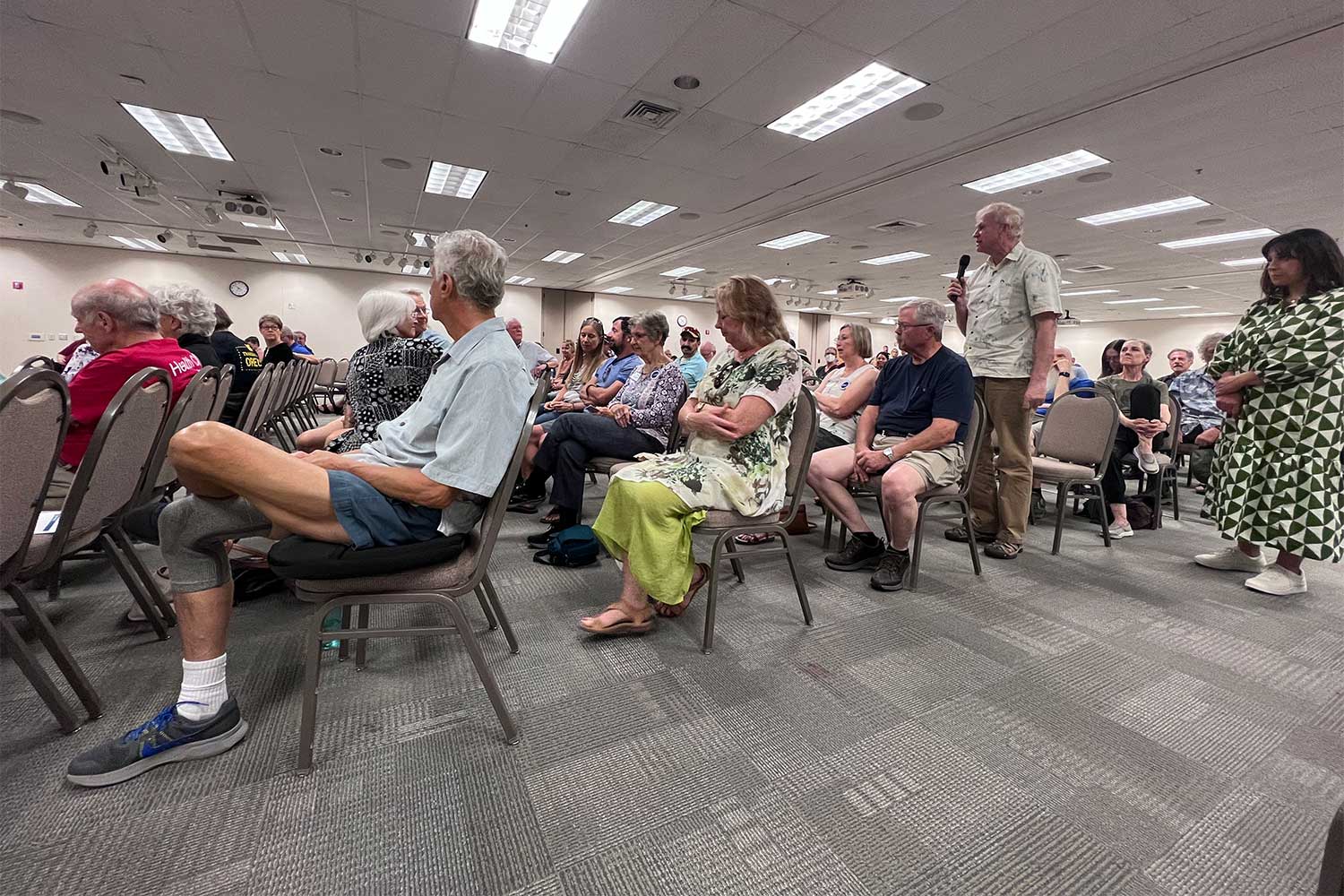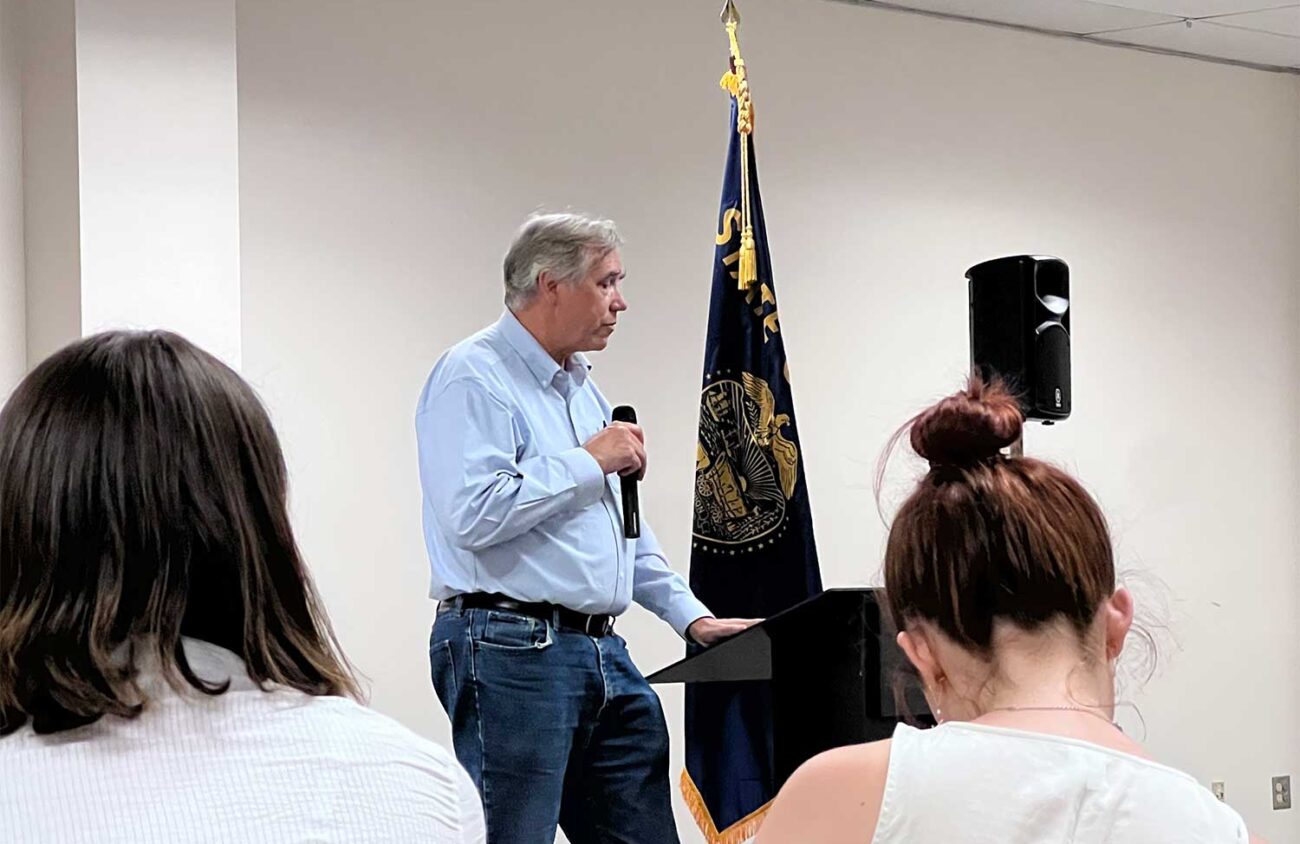On July 16, U.S. Sen. Jeff Merkley spoke at Lane Community College for the last stop on a summer statewide town hall tour. Wearing cowboy boots and a regular white and blue collared button-up, he answered questions from Oregonians about why his climate change actions are moving slowly.
During the town hall, Merkley discussed bullet train infrastructures, the logging of old-growth trees through the Bureau of Land Management and how the Inflation Reduction Act has fallen short for community members.
The LCC room was lined with Lane County residents thanking Merkley for his action in Congress in gaining funding this fiscal year that went towards many community-initiated projects. With this appreciation came questions holding the senator accountable by bringing up slow-moving progress against increasing green climate resources in Oregon.
A U.S. veteran said that the senator has always been forward-thinking about the climate and the infrastructure in the nation during his time in office, but wondered what was getting in the way of upgrading Oregon’s railway infrastructure.
“It would create better jobs and better improve the economy,” the community member said. “It would be a good alternative to a greener climate resource, cleaner infrastructure than just driving, and it would help a lot of people commute from one city to another for jobs, for example.”
He went on to say that a bullet train, like the bullet trains in Japan and Europe, can be efficient enough to tackle all of these problems at the same time.
Merkley said the bullet train system in China now has more than 15,000 miles, but the investments that were made to do the same in the U.S. have created too many obstacles.
“Now, why isn’t that happening in the U.S.?” he asked. “Well, we did make a massive investment in a bullet train for California, and it’s had nothing but challenges.”
He said construction of the rail system was often behind schedule and was over cost. The senator says the costs of continuing these railways in other states would bring too many challenges to local communities.
Another climate topic that came up is Sierra Pacific Industries and its logging of old-growth forests.
Ken Jones, another community member, chimed in that he was glad the senator wove climate change into every question even if it didn’t necessarily relate.
“They’re looking at old-growth forests, and are getting auctions and bidding on them,” Jones said of SPI. “And Biden is trying to come up with a plan for how to handle old-growth forests, but it’s going slow and as it’s going slow, we’re losing more lands and forests.”
Jones was referencing the Bureau of Land Management’s N126 timber sale, which would include logging on late-successional reserve forests, which are typically set aside for spotted owl habitat under the Northwest Forest Plan.
“Yeah, I’m in connection on the BLM lands, the U.S. federal forest lands and my simple response is, hell no, don’t cut any old growth,” Merkley said.
Enlarge

The senator said the country has very few acres of these old-growth trees that carry more carbon than others, making them crucial to our ecosystem.
“They serve the ecosystems in incredible amounts from absorbing more water, preventing a flood runoff, from storing more carbon to having more fire resilience,” he said.
The nation has other areas of second-growth trees that are not old-growth, Merkley said, and he sees no reason that these trees, which provide ample benefits, should be a part of this sale.
Merkley said he is working with collaborative landscapes and stewardship agreements that Oregon can lead to prevent these sales in the future.
The next question came from community member Richard Barnhart, who brought up the Inflation Reduction Act of 2022, which he said has offered powerful incentives to convert fossil fuel energy to clean energy.
The act offered $300 billion in deficit reduction and $369 billion in energy security and climate change programs over 10 years and called for permitting reform legislation to be passed before the fiscal year was over.
“Our permitting process as it currently exists takes an average of 10 years from the time an electrical transmission line is planned to when it can actually be built and put into focus or into use, and that’s not satisfactory,” Barnhart said.
He says that this delay is not going to get the nation where we need to be with clean energy fast enough.
“In the conversations that President Biden had over the debt ceiling, he couldn’t get bipartisan support for transmission permitting,” Merkley said.
The senator said that the Republicans who were in those negotiations said they will talk about transmission lines in the future as a part of a deal with the Clean Water Act.
“Now, I’ve been pretty hard on the Biden administration, because they’ve been doing an all-the-above strategy,” Merkley says, “But they also did massive leasing in the Gulf of Mexico. They proceeded to do a $25 billion loan guarantee for a new pipeline in Alaska. They said green light to a new liquid fossil gas LNG in Alaska and the Willow project in New North Slope massive drilling project,” he said.
Merkley spent the town hall diving into the complexities of climate change reform and guiding community members through the processes that are happening in Congress.
“My message to the Biden administration is I love what you campaigned on when you said there would be no more drilling,” he says. “But we have to quit doing new fossil infrastructure if we’re going to turn the corner and actually save this planet.”
